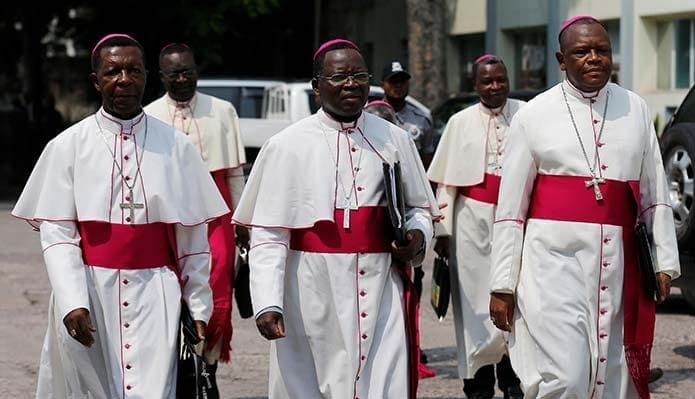 CNS photo/Thomas Mukoya, Reuters
CNS photo/Thomas Mukoya, Reuters Congo
Congo’s bishops: Catholics face new wave of violence
By CATHOLIC NEWS SERVICE | Published April 20, 2017
KINSHASA, Congo (CNS)—Congo’s bishops said Catholics are facing a new wave of violence following the collapse of a church mediation plan, and in some places church leaders have fled to the forest.
In late March, the bishops abandoned attempts to arrange a government-opposition power-sharing settlement and, within days, violence erupted in eastern Congo.
“The militias are continuing their macabre operations—each passing day sees new killings and burning of religious buildings,” said a statement on the bishops’ conference website.
“The worst affected is the Diocese of Luebo, where the bishop’s house, library, sisters’ convent and vehicles have been burned, and priests and religious have fled to the forest with other inhabitants. The situation is harsh and unbearable.”
The statement followed attacks on church personnel and property in Congo’s Kasai and Kivu regions.
Bishop Sebastien Muyengo Mulombe of Uvira said the situation in Kivu had been exacerbated by the arrival of 15,000 refugees from neighboring Burundi, adding that he had been forced to suspend wages to teachers at local church schools after a delivery driver was killed in a robbery.
“The militias are arming young people who can’t continue studies and have no work; in these conditions, for $20, you can manipulate whomever you wish,” the bishop told France’s Catholic La Croix daily April 3. “We are in a state of permanent insecurity, of car-hijacking, pillaging and killing. These are reported to us each day.”
December accord fails in March
Archbishop Marcel Utembi Tapa of Kisangani, the bishops’ conference president, said on March 28 that the bishops had abandoned attempts to arrange a government-opposition power-sharing agreement, amid rising violence.
He said the latest round of political negotiations was not satisfying the Congolese people. He said bishops had continued working with both sides until March 27, but that all parties were pulling back from a consensus on issues previously agreed upon.
“This lack of sincere political will did not allow for an agreement,” the archbishop said at a March 28 news conference.
“We are therefore bringing the political impasse in these discussions to national and international attention—as well as the lack of political goodwill and the incapacity of the political and social actors to find a compromise.”
Archbishop Utembi said the bishops believed power-sharing negotiations, which followed a Dec. 31 church-brokered peace accord, were now “in a state of failure.” He added that the politicians involved had failed to prioritize the nation or the people’s welfare.
“The bishops’ conference cannot mediate endlessly. It will now be up to President (Joseph) Kabila to find quick ways to implement agreement on a national unity government that can lead the country to presidential and parliamentary elections.”
The bishops’ conference launched a mediation bid after opposition leaders accused Kabila of seeking to retain power after the Dec. 20 expiration of his second and final term.
Under the Dec. 31 accord, the president was to remain in office pending elections by the end of 2017, alongside a government headed by an opposition-nominated prime minister, but it also had to comply with constitutional provisions barring him from a third term.
However, press reports said the accord’s implementation had been left in doubt since the Feb. 1 death of opposition leader Etienne Tshisekedi, who was to have headed a 28-member National Transition Council.